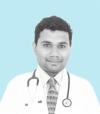How Is Cardiomyopathy Diagnosed?

 Mon, 18 Aug 2014
Answered on
Mon, 18 Aug 2014
Answered on
 Wed, 3 Sep 2014
Last reviewed on
Wed, 3 Sep 2014
Last reviewed on
Diagnosis by examination and testing
Detailed Answer:
Hello Manesh, Thanks for coming to HealthCareMagic,
I will do my best to give you general information on the diagnosis of Cardiomyopathy. If you would like to give us some more information as to what is going on, who is being tested and why there is a suspicion of Cardiomyopathy, then we can even get you in touch with a Cardiologist if you wish.
Generally, Cardiomyopathy is diagnosed based on the patients medical and family histories, a physical exam, and the results from tests and procedures.
It is important for the a doctor to know whether anyone else in your family has had cardiomyopathy, heart failure, or sudden cardiac arrest.
A doctor will use a stethoscope to listen to the patients heart and lungs for sounds that may suggest cardiomyopathy. These sounds may even suggest a certain type of the disease.
For example, the strength of the sounds, timing, and location of a heart murmur may suggest something called obstructive hypertrophic cardiomyopathy (a specific type of Cardiomyopathy). A "crackling" sound in the lungs may be a sign of heart failure. (Heart failure often develops in the later stages of cardiomyopathy.)
Physical examination is very important to help us diagnose cardiomyopathy. Swelling of the ankles, feet, legs, or abdomen is important to note. Even bulging of veins in the patients neck suggests fluid buildup, a sign of heart failure.
Next lets move on to testing:
1) Chest X Ray:
-----------------
A chest x ray takes pictures of the organs and structures inside your chest, such as your heart, lungs, and blood vessels. This test can show whether the patients heart is enlarged. A chest x ray also can show whether fluid is building up in the patients lungs.
2) ECG (ElectroCardioGram):
--------------------------------
An ECG is a simple test that records the heart's electrical activity. The test shows how fast the heart is beating and its rhythm (steady or irregular). An ECG also records the strength and timing of electrical signals as they pass through each part of the heart. that record of strength is very important as that can help us determine f the heart is enlarged in any part. A sign of Cardiomyopathy.
3) Echocardiography:
------------------------
This is the most important one and gives us the fastest and easiest way to screen for myopathy. An ECHO is a test that uses sound waves to create a moving picture of a persons heart. The picture shows how well the patients heart is working as well as its size and shape.
There are plenty of other tests that can be used for detecting Myopathy, but I'm not going to trouble you with them just yet. These 3 basic tests along with history taking and physical examination are the first steps tword diagnosis.
Let me know if you need any more information or if there is anything in my explanation that needs further clarification. I will do my best to help. Of course, the more information you can give me, the better I will be able to help you.
I look forward to your thoughts,
Vinay

Thanks for your prompt reply. The symptoms were short of breath and fiatigue. The Echo is done and the doctor told that the heart muscle is slightly thicker.
Slight thickening and furthur testing
Detailed Answer:
Hey there, always happy to help. Slight thickening of the muscle shouldn't be so concerning in my opinion. But I'm NOT the expert here. I think it would be best if you sent a query through your corporate portal directly to a cardiologist. Use the Ask a Specialist option and give ALL the details you can give. You will have the correct expert working for you then.
Make sense?
Vin
Answered by

Get personalised answers from verified doctor in minutes across 80+ specialties



